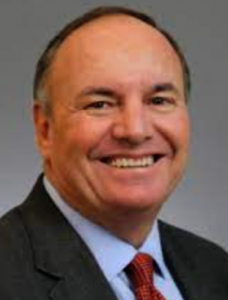“Yes!”
That is the overwhelming response from Georgia Baptist Mission Board retirees whose health care benefits are being extended another year.
The benefits were cancelled by the largest Southern Baptist state convention east of the Mississippi River in late 2021 among a series of budget shortfalls and massive staff reductions of more than 50%. The agency gave a one-year grace period in 2022 to allow for a year of transition.
For two months, Georgia was the only state convention to retroactively remove benefits from retirees who, some in their late 80s and early 90s with chronic illnesses, would struggle to make up the loss.
But two months after the elimination of benefits, the agency’s Health Care Ministry Foundation stepped up to the plate at the annual meeting. The announcement to restore the benefits, which can range from a couple thousand dollars for newer retirees and up to $5,000 or more for those who retired a couple of decades or more ago, was met with overwhelming applause.
The concern was whether that funding would continue for 2024.

Larry Wynn
The worry was all for naught, says HCMF Executive Director Larry Wynn.
When contacted by Baptist News Global, Wynn gave an enthusiastic “absolutely” response to the 2024 funding question.
He confirmed the grant was among several that had been approved at the October meeting of the Foundation’s board. He also said he was making an exception to announcing the retirees grant early; all other grants, made on a conditional basis or letters of denial, will be mailed in early December.
Wynn volunteered that the desire to assist the retirees came from within its board and there was no outside pressure.
At the initial announcement at the annual meeting in 2021, Wynn said, “They (the HCMF board) not only unanimously approved this, but they also enthusiastically approved this.” He said this week the sentiment is just as strong now and it was then.
Earlier published reports put the cost of funding nearly 170 retirees at close to $700,000. Wynn assured retirees they will receive the same stipend from previous years with no reduction in payout.
Open enrollment decisions
What had retirees on edge is that the annual Medicare Supplemental Insurance open enrollment begins each Oct. 1 and they needed to know if the stipends would be forthcoming. Some told BNG they would have to cut their budget by several hundred dollars a month and have to find alternate ways of funding their policy, commonly known as Medigap.
If they were not going to receive the funding, they would have to downgrade to a less expensive policy — with far less coverage.
News of the forthcoming funds is what caused retirees like Dennis Rogers to breathe a sigh of relief and express his gratitude for the generosity of the Health Care Ministry Foundation.
“Judy and I literally owe our lives to the Foundation for extending our benefits.”
“Judy and I literally owe our lives to the Foundation for extending our benefits,” he said. “We are encountering health concerns and hospitalizations we could not anticipate when we retired.
“It’s not a luxury, it is essential to maintain our health through the purchase of supplemental insurance policies not covered through Medicare, as well as policies for prescription medications,” he said from their home in Rome.
Retirees are somewhat concerned that too many in the working world do not understand that Medicare only pays 80% of costs. The Medigap policy provides the other 20% that can cost several thousand dollars if paid out of pocket.
Rogers likened the ending of retiree benefits in 2021 to the breaking of a spiritual and moral contract. Others had similar stories of dependence on the income on which they had been assured, if not promised in writing. Many spoke of serving additional years to qualify for the benefit.
Several shared stories of the peace of mind they received by learning of the Foundation’s commitment to their situation. Understandably, they chose not to be identified with their failing health issues.
One retiree in Atlanta described a Medigap policy that covers a $6,000 injection which is required a few times each year. Without the Foundation’s assistance to pay the premium, they would have to downgrade to a less expensive policy that would not cover the treatment.
In that scenario, which they were expecting before learning of the Foundation’s decision, they would have to appeal to the generosity of the pharmaceutical company as a hardship case.
In Northeast Georgia, a 60-year-old new retiree talked about their unexpected diagnosis of Parkinson’s Disease. Another outside Savannah talked about having a stroke, an AFIB diagnosis, and several hospital stays … and one encounter in which their heart stopped for three minutes before being revived.
A single woman with nearly 30 years seniority at retirement described making plans to cut back on groceries and driving her car less to save on gas and maintenance on the vehicle.
“I needed to know as soon as possible in early October to study the plans and see what I could afford.”
“I needed to know as soon as possible in early October to study the plans and see what I could afford. Knowing I will be getting my stipend gives me peace of mind at night,” she said.
“Believe me, it’s one health issue after another that you never expect to encounter. Doctor visits, surgeries, increases in the cost of medication … it all adds up. You soon find yourselves living in a modern-day version of Scripture from the Book of Solomon where it teaches that ‘it’s the little foxes that spoil the grapes,’” she said.
Today an individual who retires at 65 has a 76% chance of living 10 or more years, a 38% change of living 20 or more years, and a 5% chance of living another 30 years. In a Guidestone webinar in 2022, a representative told participants men today have an average lifespan of 84 years, while women tend to live to 86 on average.
Increasingly, some such as at least three Georgia Baptist retirees, make it into their 90s.
Health Care Foundation has long history of charitable ministry
The Foundation is the descendent of the Georgia Baptist Health Care System, which began around 1900 operating out of Tabernacle Baptist Church in downtown Atlanta. That clinic, under the direction of pastor and doctor Len Broughton, eventually spanned the state with a top-quality network of hospitals and clinics. The properties eventually were sold off in the rise of red tape and managed health care programs with insurance companies gaining a stronger presence in their operations.
The proceeds from the sale were used to seed the Foundation, which invests the funds and uses the interest to distribute statewide to charitable organizations that fit their values and evangelistic outreach.
The late Frank Upchurch, the Foundation’s first executive director, described the new entity as transitioning from a brick-and-mortar health care delivery system to being “a hospital without walls.”
The Foundation is not associated with the state convention’s more traditional foundation that raises funds and assists with estate planning and other financial programs. The Health Care Ministry Foundation is separate from the state convention with its own budget and self-governing board of directors. It is not involved in fundraising and operates strictly off income derived from its investments.
While some grants can be awarded on a recurring basis, there is no guarantee. In 2023 there were 19 new recipients but there is no formula to dictate how many or few recipients to include.
Historically, the retirees were funded through the Georgia Baptist Cooperative Program budget, which is offering income from the state’s 3,370 churches. That reliable source of funding ended with the recommendation of the Mission Board’s budget committee, a subgroup of the top-ranking Administration Committee.
At this year’s February award ceremony, the Foundation issued 93 grants totaling $8,846,868. Based on feedback from recipients, it reported the funds touched 256,000 lives, resulted in 207 professions of faith and 64 baptisms, and was responsible for 213 pregnancies brought to full term.
It further estimated the grants provided a market value of $75,364,801 while involving 11,987 volunteers.
Mission Board still without budget
This year the retirees were fearful because the state convention failed to provide a 2024 budget in September — the first time in its history — as officers said they needed more information. The aging former employees took that as a signal that another financial shortfall had sealed their fate in never having the funds restored.
Now just 12 days remain until the annual meeting where messengers traditionally approve a budget that remains MIA.
Now just 12 days remain until the annual meeting where messengers traditionally approve a budget that remains MIA.
At last November’s annual meeting in suburban Atlanta, David Melber, the state mission board’s chief financial officer, said he expected Cooperative Program giving to continue a downward trend in the coming year.
Since 2007, Cooperative Program giving in Georgia has fallen from $49.5 million to a projected $34.3 million in 2022.
“We began seeing this downward trend in 2007, and in a seven-year period leading up to 2014, Cooperative Program giving had declined by nearly $10 million,” Melber said. “In the following seven years, between 2015 and 2022, it had fallen another $6.5 million.”
Last December, the mission board vacated its five-story headquarters located on 40 prime acres in Gwinnett County in an ongoing downsizing effort. Two efforts to sell the 17-year-old structure failed, the second shortly after staff were divided between two locations in January of this year.
Accounting and human resources staff now work out of an office about 10 miles north in Suwanee, and the remainder are based out of Hebron Baptist Church in Dacula.
In 2015, the Health Care Ministry Foundation stepped in and paid off the remaining $25 million debt, leaving the state convention free of debt. The land and construction of the building cost Georgia Baptists $42.3 million.
Before COVID, the real estate was valued at nearly $65 million, but more recently the county appraised the building at $30.5 million and the land at $7.1 million, according to the Atlanta Journal Constitution.
Related articles:
Georgia Baptists eliminate retiree benefits, citing budget concerns
Six days after BNG report, Georgia convention finds new funds for retiree health benefits
Georgia Baptists hit snag on sale of 16-year-old headquarters property in suburban Atlanta
Georgia Baptist Mission Board to vacate property and move into a local church


